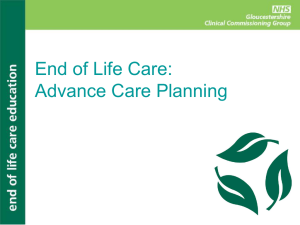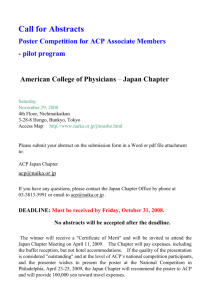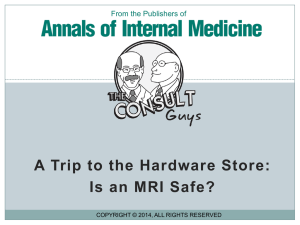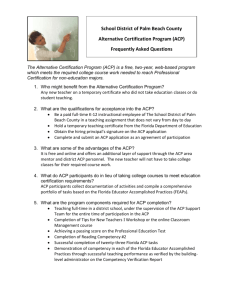here - Advance Care Planning CRIO
advertisement
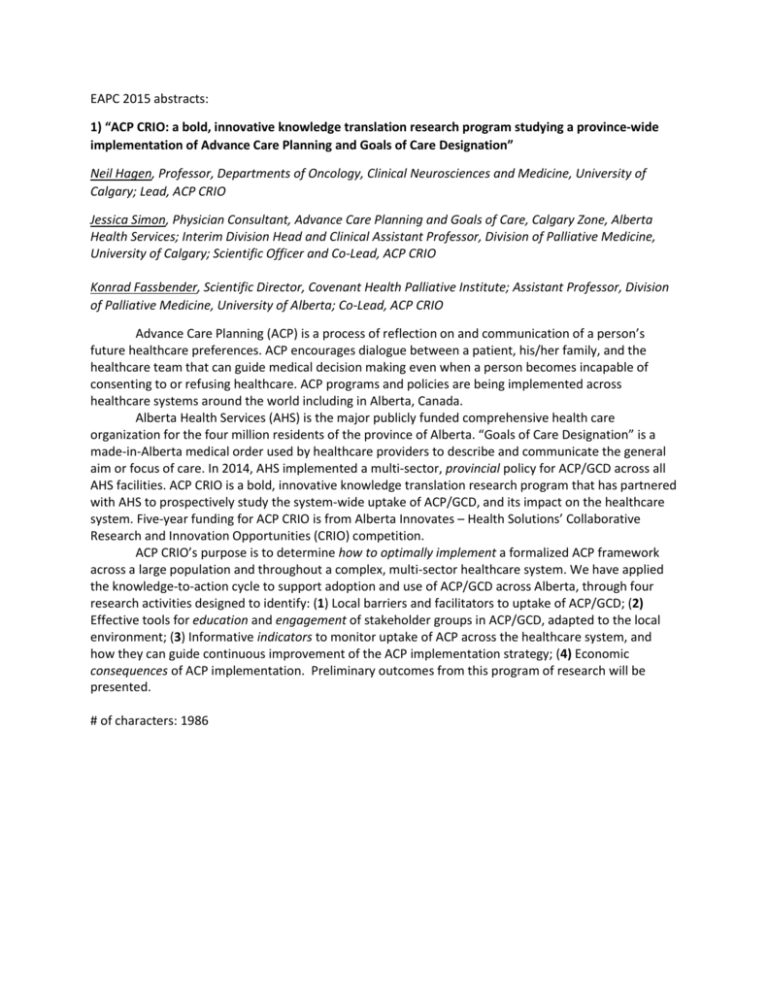
EAPC 2015 abstracts: 1) “ACP CRIO: a bold, innovative knowledge translation research program studying a province-wide implementation of Advance Care Planning and Goals of Care Designation” Neil Hagen, Professor, Departments of Oncology, Clinical Neurosciences and Medicine, University of Calgary; Lead, ACP CRIO Jessica Simon, Physician Consultant, Advance Care Planning and Goals of Care, Calgary Zone, Alberta Health Services; Interim Division Head and Clinical Assistant Professor, Division of Palliative Medicine, University of Calgary; Scientific Officer and Co-Lead, ACP CRIO Konrad Fassbender, Scientific Director, Covenant Health Palliative Institute; Assistant Professor, Division of Palliative Medicine, University of Alberta; Co-Lead, ACP CRIO Advance Care Planning (ACP) is a process of reflection on and communication of a person’s future healthcare preferences. ACP encourages dialogue between a patient, his/her family, and the healthcare team that can guide medical decision making even when a person becomes incapable of consenting to or refusing healthcare. ACP programs and policies are being implemented across healthcare systems around the world including in Alberta, Canada. Alberta Health Services (AHS) is the major publicly funded comprehensive health care organization for the four million residents of the province of Alberta. “Goals of Care Designation” is a made-in-Alberta medical order used by healthcare providers to describe and communicate the general aim or focus of care. In 2014, AHS implemented a multi-sector, provincial policy for ACP/GCD across all AHS facilities. ACP CRIO is a bold, innovative knowledge translation research program that has partnered with AHS to prospectively study the system-wide uptake of ACP/GCD, and its impact on the healthcare system. Five-year funding for ACP CRIO is from Alberta Innovates – Health Solutions’ Collaborative Research and Innovation Opportunities (CRIO) competition. ACP CRIO’s purpose is to determine how to optimally implement a formalized ACP framework across a large population and throughout a complex, multi-sector healthcare system. We have applied the knowledge-to-action cycle to support adoption and use of ACP/GCD across Alberta, through four research activities designed to identify: (1) Local barriers and facilitators to uptake of ACP/GCD; (2) Effective tools for education and engagement of stakeholder groups in ACP/GCD, adapted to the local environment; (3) Informative indicators to monitor uptake of ACP across the healthcare system, and how they can guide continuous improvement of the ACP implementation strategy; (4) Economic consequences of ACP implementation. Preliminary outcomes from this program of research will be presented. # of characters: 1986 2) How do healthcare systems evaluate their Advance Care Planning initiatives? Results from a systematic review Lydia D. Lee1, BHSc; Patricia D. Biondo1, PhD; Sara N. Davison1,3, MD, FRCPC, MSc; Jessica E. Simon1,2, MBChB, FRCPC Affiliations: 1. Advance Care Planning Collaborative Research and Innovation Opportunities Program (ACP CRIO), University of Calgary, Calgary, Alberta Canada 2. Division of Palliative Medicine, Department of Oncology; Department of Internal Medicine, University of Calgary, Calgary, Alberta, Canada 3. Division of Nephrology, Department of Medicine, University of Alberta, Edmonton, Alberta, Canada Abstract Background: Advance Care Planning (ACP) is a process of reflection and communication of a person’s future healthcare preferences. ACP is being implemented across healthcare systems around the world. However, there is no consensus on what measures to use to assess the effectiveness, impact, and sustainability of ACP implementation. Aims: To describe and synthesize the existing information on how health care systems have evaluated the implementation of conversation-based ACP programs/initiatives. Methods: A systematic search of the peer-reviewed and grey literature (to March 2014) was conducted to identify articles describing the implementation and evaluation of a health system-level ACP initiative. Using the PICOS model, 734 titles/abstracts from the peer-reviewed literature and 76 grey literature documents were screened, and 130 full text articles were assessed for eligibility. Results: Forty articles met inclusion criteria for analysis. Most articles reported on single parts of a healthcare system only e.g. most evaluations occurred in continuing care. The most common outcome measures pertained to document completion, followed by healthcare resource use and ACP service components. Patient-, family-, or healthcare provider-reported outcomes were less commonly measured. Conclusion: Document completion is frequently used to evaluate ACP program implementation; capturing the quality of care appears to be more difficult, as is evaluation across complex, multi-sector healthcare systems. This systematic review provides health system administrators with a comprehensive summary of measures used to evaluate ACP, and may identify gaps in evaluation within their local context. In Alberta, these results are being used to inform a Delphi process to determine important indicators relevant to ACP uptake within the healthcare system, and further, to develop a dashboard for ongoing monitoring of ACP implementation and sustainability across the province. # of characters: 1971 3) Implementing Advance Care Planning across a Healthcare System: identifying local barriers and facilitators Authors (order TBD): Neil A. Hagen1,2, Nakul C Sharma 3, Jonathan G. Howlett 3, Jayna M. Holroyd-Leduc4, Patricia D. Biondo1, Jessica E. Simon1 and Konrad Fassbender5 1 Department of Oncology, the University of Calgary, Calgary, Canada 2 Departments of Clinical Neurosciences and Medicine, the University of Calgary, Calgary, Canada 3 Division of Cardiology, Libin Cardiovascular Institute of Alberta, the University of Calgary, Calgary, Canada 4 Departments of Medicine and Community Health Sciences, the University of Calgary, Calgary, Canada 5 Division of Palliative Medicine, University of Alberta, Edmonton, Canada Background: Advance Care Planning (ACP) is a process of reflection and communication of a person’s future healthcare preferences. Promulgation of ACP is a priority for many healthcare systems. However, how to prospectively identify potential local barriers to uptake of ACP across a complex multi-sector healthcare system and develop specific mitigating strategies, is not well understood. Aims: To understand local barriers and facilitators to the uptake of ACP across the publicly funded provincial healthcare system in Alberta, Canada, and to identify mitigation strategies relative to the local context. Methods: We surveyed Alberta Strategic Clinical Networks (SCNs)—teams tasked with implementing transformational innovation in healthcare. The survey was based on published literature on barriers and facilitators to ACP and on the Michie Theoretical Domains Framework to address changes in healthcare provider behavior in the uptake of best practices. Results: Fifty-one of 88 SCN members (58%) completed the survey. “Insufficient public engagement/understanding”, “conflict among different provincial health service initiatives”, and “lack of infrastructure” were identified as the most important local barriers. From a health practitioner point of view, “lack of time to engage patients”, and “inadequate electronic reporting systems” were identified as significant barriers. “Mastery of the skills needed”, and “emotional discomfort with initiating the ACP/GCD process” were also highlighted. These barriers were then explored through a semi-structured interview with key informants, who identified mitigating approaches. Conclusion: Identifying and addressing local barriers to the uptake of innovation has been described as a core element of successful knowledge translation. Identifying and addressing local barriers to ACP uptake and identifying mitigating strategies through discussion with key informants was successfully undertaken through a brief survey and group discussion. # of characters: 1993 4) Factors associated with increasing public participation in Advance Care Planning in Alberta, Canada Simon, Jessica; University of Calgary, Division of Palliative Medicine, Department of Oncology; University of Calgary, Department of Internal Medicine Ghosh, Sunita; University of Alberta, Department of Medical Oncology; University of Alberta, Department of Mathematical and Statistical Sciences; Alberta Health Services, Cancer Control Heyland, Daren; Kingston General Hospital, Clinical Evaluation Research Unit, Department of Medicine; Queen’s University, Department of Community Health and Epidemiology Cooke, Tim; Health Quality Council of Alberta Davison, SN; University of Alberta, Division of Nephrology, Department of Medicine Holroyd-Leduc, Jayna; University of Calgary, Department of Medicine; University of Calgary, Department of Community Health Sciences Wasylenko, Eric; University of Calgary, Division of Palliative Medicine, Department of Oncology; University of Alberta, John Dossetor Health Ethics Centre Howlett, Jonathan; University of Calgary, Department of Cardiac Sciences; Libin Cardiovascular Institute, Fassbender, Konrad; Covenant Health Palliative Institute; University of Alberta, Division of Palliative Care Medicine, Department of Oncology Background: Advance Care Planning (ACP) encompasses both verbal and written communications expressing preferences for future health and personal care and helps prepare people for healthcare decision-making in times of medical crisis. Governments and healthcare systems are increasingly promoting ACP as a way to inform medical decision-making but it is not known whether public engagement in ACP activities is changing over time. Methods: Raw data from two independently conducted public polls of ACP engagement over a 6-year time period were analyzed to answer: (1) Did participation in ACP activities change over time? (2) Did intra-provincial variation in ACP health system policy explain differences in engagement? Results: Statistically significant increases were observed between 2007 and 2013 in: recognizing the definition of ACP (54.8% to 80.3%, OR 3.37 (95% CI 2.684.24), discussions about healthcare preferences with family (48.6% to 57%, OR 1.41 (95% CI 1.17-1.69) and with healthcare providers (9.1 to 17.9%, OR 1.98 (95%CI 1.51-2.59), written ACP plans (21 to 32.1%, OR 1.77 (95% CI 1.45-2.17) and legal documentation (23.3 to 39.3%, OR2.13 95% CI (1.75-2.59). These remained significant after adjusting for age, education and self-rated health status. Public participation in ACP could not be explained through intra-provincial variations in ACP policies. Conclusion: ACP engagement is increasing over time, although the overall frequency remains low. Examination of factors responsible for the increase may provide insight into areas for future investment. We also discuss potential reasons why health system policy presence alone may not influence public participation. # of characters: 1686


